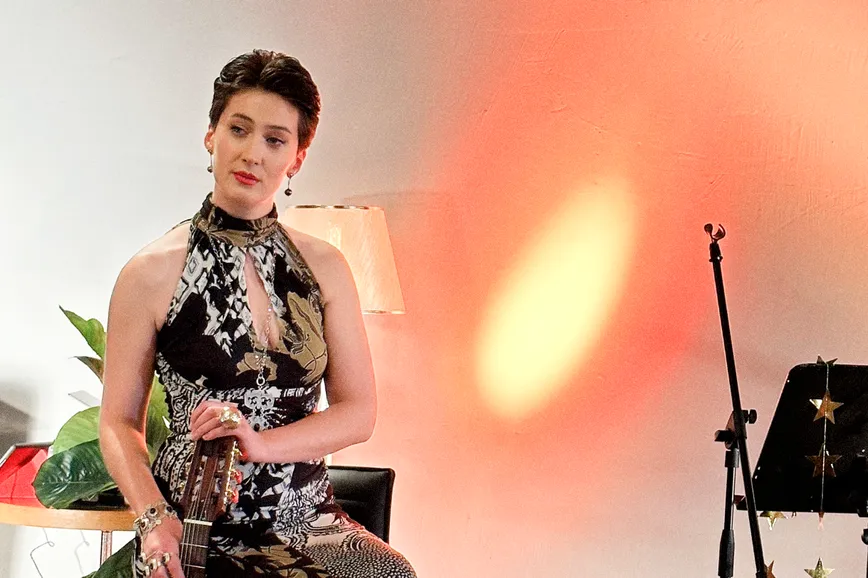On December 3, Kazakh performer Polina Hanym (real name Polina Tyrina) presented a new musical project in Astana - Qazaq Bossa Nova, which included three compositions: "Garota de Ipanema" (Girl from Ipanema), "Insensatez," and "Corcovado." The songs were translated and performed in Kazakh for the first time.
Polina Hanym has long captivated Kazakh and foreign audiences with her incredible musical experiments. Qazaq Bossa Nova is a bold attempt to imagine how the famous bossa nova would sound if it appeared in Kazakhstan today. The compositions are full of unpredictable harmonies, sensual vocals, and rhythmic beats.
During the presentation, listeners in an intimate and cozy atmosphere were able to hear live performances of all tracks from the maxi-single, as well as other favorite compositions. The intimacy was enhanced by warm and friendly communication between the artist and the audience between the compositions, performed with the accompaniment of a live band.
QazMonitor reporter had a chance to sit down with Polina Hanym before the concert to ask about her new stage name, favorite tracks on the release, and, most importantly, her relations with the audience and the balance between the music business and creative experiments.
Let's start with the stage name. Why did you change it?
Actually, I've been thinking about changing my stage name for a long time because, as Polina Tyrina, I've done so many different things. They're very diverse. On the one hand, it's all me, but on the other hand, it creates some kind of chaos of perception. Well, globally, perhaps, I'm preparing to release my own songs, so it's like a new stage for me. For that, I also wanted to separate myself a little bit from everything that was before. I've been thinking about what to call myself, and it's a nightmare to have to come up with something. I'm not the kind of artist who can come up with a separate life as an artist and a separate life in my real life. I just saw in the comments a few times I was addressed to as Polina Hanym on social media. I thought, that's beautiful, I like the way it sounds. On the other hand, this name allowed me to remain myself and reflects some particularity of my personal story.
After all, I was born and raised here, in Astana, and that, of course, couldn't help but make some contribution. In short, I don't know a single Russian folk song, but I can play a concert of Kazakh folk songs. In general, I like the concept [of the word] itself because I don't think I can find a single word in the Russian language that would reflect the same way.
And when did you start to unite different cultures in your songs?
I studied guitar in the guitar section with Tagir Menshayevich Aitbaginov in the capital's Palace of Schoolchildren. Everything probably began with the fact that in the sixth-seventh grade, a Kazakh teacher asked me to learn and perform the song "Kozimnin Karasy" at the contest "Songs of Abay." I agreed, learned and performed the song. Then, over the years, this 'music piggy bank' just grew bigger and bigger. As I grew older, I began to notice, think, and understand more. In general, globally, it's any kind of creativity. It is a study of oneself, first of all. Why do people engage in creativity? Because they are looking for their own way, trying to find creativity in it. And it's also my path; it spirals every time with a new force.
Tell us about your new maxi-single. Do you think it resonates more with your current audience, or is it more aimed at new listeners?
That's exactly the question that confirms that I'm not quite the right musician from a business point of view. I didn't ask myself that question when I made this single. I acted purely out of creative experimentation and an interest of this kind of inner recreation. Who might be interested in this music, I can judge by my audience, by the people who come to the concerts. I really love my audience because they amaze me every time. How interesting people are, how beautiful people are. But it's not my thought; it's statistics that say that jazz listeners are, most often, people with a high level of education. High level of education, high level of income. Educated, beautiful people. [laughs] That's just what I see at concerts.
All tracks on the maxi-single are in Kazakh. It's an extremely difficult task. It's one thing to translate the text, and another to put it in size and rhythm, to convey emotions. How was the translation created?
I can only say here a comment from the poet-translator Nargiz Makrayeva. She says, from the lexical point of view, she used words to make it as close and understandable as possible to native Kazakh speakers. That is, to make it feel as warm to them as in the original. Understandable, and easy on the ear, so that it could be translated to music. And she did it masterfully in terms of music meter; everything fits perfectly. I didn't make any adjustments because it all sang normally for me, and Nargiz is truly energetic in a musical way. So she did the work perfectly.
And finally, what’s your favorite track on the new release?
Of course, "Ipanema Qyzy."
